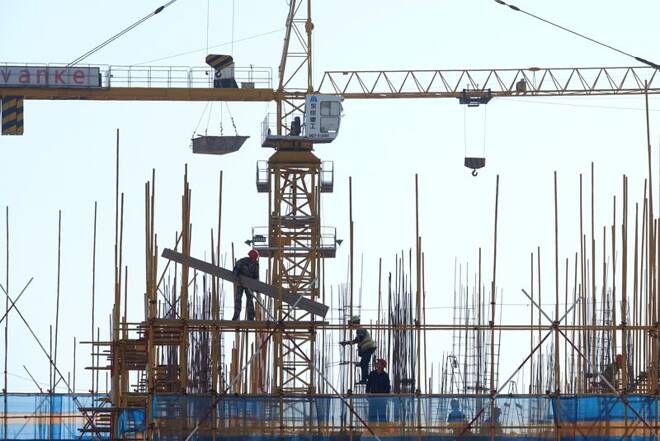Advertisement
Advertisement
Three of China’s biggest banks to provide support for property developers
By:
BEIJING (Reuters) -China's Bank of Communications Co Ltd (BoCom) said on Wednesday it would provide a 100 billion yuan ($13.98 billion) credit line to developer Vanke in the latest sign of support for the embattled property sector.
BEIJING (Reuters) -Three of China’s biggest commercial banks have agreed to provide fundraising support to property developers, including industry giant Vanke, in a coordinated effort to support the country’s embattled property sector.
It marks one of the latest moves by state-owned banks to respond to Beijing’s call to ease pressure on debt-laden developers and reverse a housing slump.
The property sector makes up about a quarter of China’s economy.
Bank of Communications Co Ltd (BoCom) said it agreed to provide a 100 billion yuan ($13.98 billion) line of credit to Vanke and a 20 billion yuan line of credit to Midea Real Estate Holding Ltd, two separate statements issued by the bank said on Wednesday.
Under the agreements, BoCom will be likely to offer the two developers property development loans, loans for M&A deals and bond investments.
The agreement is part of BoCom’s efforts to implement 16 measures outlined by Chinese regulators that aim to boost liquidity in the property sector, the bank said in the statements.
“BoCom will continue to fulfill the responsibility of a state-owned bank, (and) accurately promote high-quality economic development with high-quality financial services,” it said.
Also on Wednesday, Agricultural Bank of China Ltd (AgBank) said it has signed strategic agreements to provide fundraising support to five property companies, including Vanke, Longfor Group Holdings Ltd and China Resources Land Ltd. The bank did not give further details on the scale of the support.
Bank of China Ltd also said on Wednesday it agreed to provide a line of credit of up to 100 billion yuan to Vanke.
Vanke is the country’s second-largest developer by sales.
China’s property sector, once a pillar of growth, has slowed sharply this year due to government efforts to restrict excessive borrowing by developers.
The clampdown has triggered falls in property investment, sales and prices, and a growing number of bond defaults. Construction of many housing projects has stalled, scaring away potential home buyers.
Chinese authorities have announced a flurry of fiscal measures recently to ease the developers’ liquidity crisis.
In the latest policy move, China’s central bank will provide 200 billion yuan in loans to six commercial banks for housing completions, according to a deputy central bank official quoted by the state-run Economic Daily on Monday.
In response to Beijing’s policy guidance, more banks are expected to sign agreements with developers to increase real estate loan issuance, said Liu Shui, an analyst at China Index Academy.
Many analysts, however, believe the property market will take a long time to recover.
“(A) broad recovery in new-home sales remains the key for a sustained improvement in developers’ liquidity profiles,” a Fitch Ratings report said on Wednesday.
“We expect no material improvement in the operating environment, as homebuyers’ confidence remains fragile amid weak economic prospects and uncertainty surrounding delivery of pre-sold properties,” the Fitch report said.
($1=7.1531 Chinese yuan renminbi)
(Reporting by Ziyi Tang and Ryan Woo; Editing by Muralikumar Anantharaman, Kim Coghill and Jane Merriman)
About the Author
Reuterscontributor
Reuters, the news and media division of Thomson Reuters, is the world’s largest international multimedia news provider reaching more than one billion people every day. Reuters provides trusted business, financial, national, and international news to professionals via Thomson Reuters desktops, the world's media organizations, and directly to consumers at Reuters.com and via Reuters TV. Learn more about Thomson Reuters products:
Advertisement
